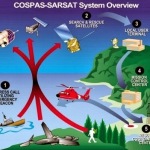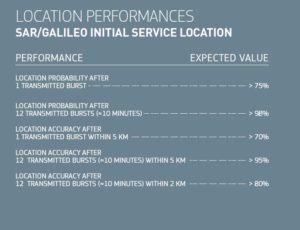Search And Rescue (SAR) operations involve locating and helping people in distress. Launched as part of the Galileo Initial Services, Galileo is the first GNSS constellation offering global SAR capability. The service will be available at sea, in the mountains, across the desert and in the air inside the Galileo/SAR Service Coverage area, this essential Galileo service helps operators respond to a distress signal faster and more efficiently.
How the Galileo SAR service works
The Galileo SAR service is comprised of two components:
- an automatic forward link distress alert
- a unique return link alert that informs the sender that their message has been received (planned to be available at the end of 2018)
Once fully integrated into the COSPAS-SARSAT system, the Search And Rescue Transponder on Galileo satellites will pick up signals emitted from distress beacons in the 406 – 406.1 MHz band and broadcast this information to dedicated ground stations (MEOLUTs) in the ‘L6’ band. Once these signals are detected and the beacons located by the MEOLUTs, COSPAS-SARSAT Mission Control Centres (MCC) will receive the beacon location information and distribute the data to the relevant rescue centres worldwide.
What is COSPAS-SARSAT?
The Galileo SAR service is Europe’s contribution to the upgrade of COSPAS-SARSAT, an international satellite-based SAR distress alert detection and information distribution system. Established in 1979 by Canada, France, the USA and the former Soviet Union, it is used to detect and locate emergency beacons activated by aircraft, ships and individuals. It provides accurate, reliable and timely alert and location data to help SAR operators find and help people in distress.
COSPAS-SARSAT operates through a satellite system maintained and coordinated by its participants. This system detects distress alert transmissions from radio beacons that comply with COSPAS-SARSAT specifications and standards, determines their location, and provides the information to SAR teams.
Currently, 43 countries and organisations participate in the operation and management of the COSPAS-SARSAT system. COSPAS-SARSAT also cooperates with various international organisations including the International Civil Aviation Organization (ICAO), the International Maritime Organization (IMO) and the International Telecommunication Union (ITU).
What it means for you
With Galileo and the increased positioning accuracy it provides integrated into COSPAS-SARSAT, users will benefit from:
- a reduction in the time it takes to detect a person at sea or in the mountains from one hour to just 10 minutes after the distress beacon is activated
- improved localisation of the distress beacon from 10 km to less than 5 km
- increased availability
- better detection of signals in difficult terrain and weather conditions
- a return link that ensures users that their distress signal has been received and help is on the way (planned to be available end of 2018)
In other words, thanks to the improvements offered by the Galileo SAR service, more lives are being saved.


